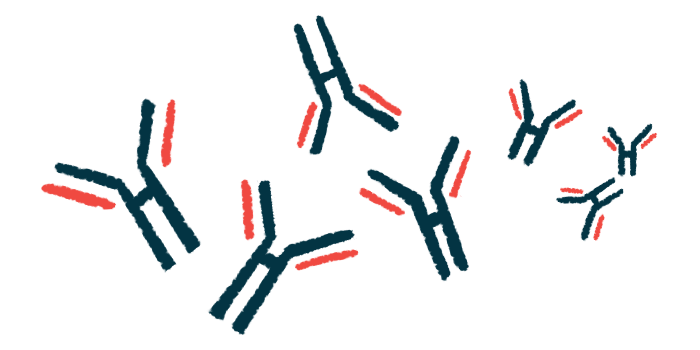Human EBV Antibodies May Help Inform Vaccine Development
Antibodies might lead to new approach in MS and cancer research, scientists say
Written by |

Scientists have identified a number of antibodies that can bind to the Epstein-Barr virus (EBV) — a major risk factor for multiple sclerosis (MS) — and prevent its infection of human cells.
The antibodies might offer new approaches to treat or prevent infection in groups of people most vulnerable to severe EBV-related diseases, the researchers noted in a new study. In fact, one of these antibodies was able to completely prevent the development of lymphoma, a type of cancer linked to EBV, in mice.
By pinning down parts of the virus that are vulnerable to these antibodies, the researchers have also identified potential target sites for vaccines against EBV, which could have a meaningful impact on MS and cancer prevention.
Their study, “Epstein-Barr virus gH/gL has multiple sites of vulnerability for virus neutralization and fusion inhibition,” was published in Immunity.
EBV is the leading cause of mono
EBV is a very common virus belonging to the herpesvirus family. It’s the leading cause of infectious mononucleosis, or mono, but many people won’t have any symptoms from an EBV infection.
The virus works by infecting a person’s B-cells, the group of immune cells that produce antibodies. After causing the initial active infection, it lives in a latent form inside B-cells for the rest of a person’s life.
In most cases, the latent virus is kept in check by other components of the immune system, which prevent it from reactivating and causing additional symptoms. However, prior EBV infection has been linked to a risk of developing certain health problems.
For example, an increasingly large body of evidence has indicated that EBV may be a leading cause of MS, raising the risk of developing the neurodegenerative disease by 32 times. The virus has also been associated with an increased risk of developing certain cancers, including lymphoma.
Still, no vaccine exists to prevent or treat EBV infection. According to researchers, because the virus can use several mechanisms for entering and infecting human cells, it’s been difficult to effectively develop such a vaccine.
[EBV-targeted antibodies] could be used alone or in combination for prophylactic or therapeutic treatment of transplant recipients or patients with certain immunodeficiencies who are highly susceptible to developing EBV-related disease
A team of researchers from the National Institutes of Health (NIH) and the Walter Reed Army Institute of Research set out to identify whether any antibodies produced by humans after EBV infection might have the capacity to fight off the virus.
In particular, they were interested in antibodies that target gH and gL, two proteins that reside on the surface of EBV and mediate its fusion with human cells.
After examining the B-cells from healthy human donors with a prior EBV infection, the researchers identified six antibodies of interest that targeted these proteins. In lab studies, all six antibodies were able to prevent EBV infection of B-cells and epithelial cells, which line the throat at the initial EBV infection site.
The antibodies were then mapped to the portion on the gH/gL proteins where they bound to exert their effects, identifying sites of the virus that may be particularly vulnerable. This helps to identify potential target areas for vaccine development, ccording to the researchers.
“The observation that multiple genetically diverse and potent neutralizing human antibodies can readily be identified indicates that gH/gL is a viable vaccine target,” the researchers wrote.
Antibody prevented development of lymphoma in mouse model
In mice, several of the antibodies also could significantly lower the viral load of EBV. One of these antibodies in particular, called mAb 769B10, was the most effective at preventing EBV infection and led to the highest survival rates after a challenge with the virus.
Moreover, this antibody was able to completely prevent the development of lymphoma in a mouse model, with no cancerous lesions observed in their liver, lungs, spleen, or kidneys after treatment.
Findings overall suggest that mAb 769B10 and other EBV-targeted antibodies “could be used alone or in combination for prophylactic or therapeutic treatment of transplant recipients or patients with certain immunodeficiencies who are highly susceptible to developing EBV-related disease,” the researchers wrote.
Additional research with mAb 769B10 is planned, according to an NIH press release.
A Phase 1 trial (NCT04645147) led by NIH researchers is currently evaluating an investigational EBV vaccine that targets gp350, another protein found on EBV’s surface. A total of 500 healthy people, ages 18 to 29, are being recruited at the National Institutes of Health Clinical Center in Maryland.

